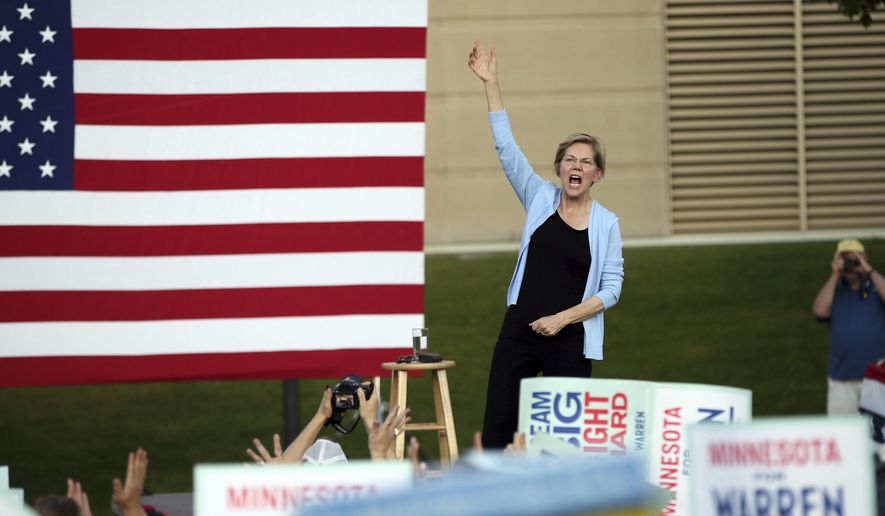Sen. Elizabeth Warren, Massachusetts Democrat and 2020 presidential hopeful, proposed Tuesday a complete overhaul of the criminal justice system, saying police and the courts have a “race problem” and victimized the poor.
The lengthy and detailed list of changes offered by Ms. Warren included a federal crackdown on “officer abuses” and steps to “break the school-to-prison pipeline.”
“We know there is a real crisis in the criminal justice system and that it’s every part of the system,” Ms. Warren said in Minneapolis, where she led a roundtable discussion on her plan at Better Futures, a nonprofit organization that helps parolees reintegrate into society.
A top item on her long checklist of reforms was repealing the get-tough crime laws passed in 1994, a jab at the front-runner in the Democratic race, former Vice President Joseph R. Biden. As a U.S. senator from Delaware, he championed the legislation that activists now blame for the mass incarceration of a generation of black men.
Ms. Warren proposed decriminalizing marijuana, ending cash bail systems that she said keeps poor people locked up, increasing federal oversight of police, and halting a federal program that makes military-style equipment from the Pentagon’s surplus available to police departments.
She also proposed raising the age for criminal liability, ending the death penalty and improving prison conditions. She vowed to use the president’s “pardon and clemency powers broadly to right systemic injustices.”
“It’s not equal justice when a kid with an ounce of pot can get thrown in jail, while a bank executive who launders money for a drug cartel can get a bonus. It’s long past time for us to reform our system,” Ms. Warren wrote in a post on Medium that detailed the plan.
The criminal justice system has become a favorite villain for the Democratic presidential candidates on the stump.
The issue is poised to take center stage in the 2020 race with candidates competing for the title of the biggest reformer.
President Trump made headway last year when he signed the bipartisan First Step Act, which retroactively cut sentences for some non-violent drug offender and has already freed thousands from federal custody.
Sen. Cory Booker of New Jersey, another 2020 presidential candidate, frequently touts his effort in passing the First Step Act, though he omits Mr. Trump’s role. Sen. Bernard Sanders of Vermont also rolled out his criminal justice reform plan Sunday, covering much of the same ground as Ms. Warren.
Mr. Sanders described his plan as standing up to “institutional racism and corporate profiteering.”
Ms. Warren and Mr. Sanders are battling for the far-left lane in the 2020 Democratic race and vying for support from black voters who are a crucial bloc in the primaries.
A coalition of black and brown activists applauded Ms. Warren and Mr. Sanders for taking on a “system that is corrupt and rotten to its core.”
“It’s clear that presidential candidates are listening to our organizations and including many of our policy demands around decarceration and dismantling the harm caused by the ‘94 Crime Bill,” the groups said in a statement. “However, the only justice plans that can move forward will require the sustained leadership of impacted communities, grassroots organizations, and black and brown-led social movements.”
The coalition, which includes Law for Black Lives and the National Council of Incarcerated and Formerly Incarcerated Women, demanded further reforms to non-prison responses to gender and gun violence, ending life without parole, decriminalizing prostitution and decriminalizing border jumping.
Like Mr. Sanders, Ms. Warren made it a priority to nix for-profit prisons that she said cause companies to push for stiffer criminal penalties to boost their profits.
“We spend billions, propping up an entire industry that profits from mass incarceration. And we do all of this despite little evidence that our harshly punitive system makes our communities safer,” Ms. Warren said. “To make matters worse, the evidence is clear that there are structural race problems in this system.”
She noted that Hispanic adults are three times more likely to be incarcerated than white people and that data shows black people are more likely than white people to be arrested, charged, wrongfully convicted and given harsher sentences.
Ms. Warren focused not only on police, courts and prisons, but also extended the effort to improve housing and education that she said would “break the school-to-prison pipeline.”
Ms. Warren said her plan would keep people out of prison and make communities safer.
“It is a false choice to suggest a tradeoff between safety and mass incarceration,” she said. “By spending our budgets not on imprisonment but on community services that lift people up, we’ll decarcerate and make our communities safer.”
• S.A. Miller can be reached at smiller@washingtontimes.com.




Please read our comment policy before commenting.